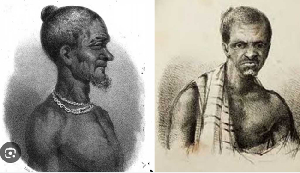The Defiant King: Badu Bonsu II’s Stand Against Dutch Colonialism
In the annals of African resistance against colonial oppression stands the remarkable story of King Badu Bonsu II, a sovereign of the Ahanta people in what is now Ghana. His execution in 1838 at the hands of Dutch colonizers marks a poignant chapter in the struggle against colonial exploitation.

A Hospitality Betrayed
The Ahanta people, known for their traditional African hospitality, initially welcomed Dutch traders to their shores in the early 17th century. However, what began as a seemingly peaceful interaction gradually revealed its darker undertones. The Dutch presence evolved from trade to exploitation, manifesting through the slave trade and illegal arms trafficking within the kingdom.
The Spark of Rebellion
By 1837, tensions reached a breaking point. When Dutch colonial officials attempted to summon King Bonsu—likely intending to imprison or enslave him in the Caribbean—the king made a fateful decision. Refusing to submit to colonial authority, he stood his ground. In the ensuing confrontation, two Dutch officials opened fire, leading to their eventual defeat and death at the hands of the king and his supporters.
Colonial Retribution
The Dutch response was swift and severe. Mercenary forces dispatched from the Netherlands arrived in May 1838 with one mission: to capture the defiant king. After two months of conflict, on July 26, 1838, King Bonsu was captured—betrayed by some of his own people who sided with the colonizers. The following day, after what can only be described as a mockery of justice, he was executed.
A Disturbing Aftermath
In a grotesque display of colonial brutality, the Dutch authorities severed the king’s head and sent it to the Leiden University Medical Centre in the Netherlands. There, preserved in formaldehyde, it remained for over 150 years until 1997—a stark reminder of colonial atrocities.
Justice Delayed, But Not Denied
After persistent diplomatic efforts by the Ghanaian government, King Bonsu’s remains were finally returned to his homeland. This long-overdue repatriation allowed his descendants to provide their ancestor with a proper burial, honoring both their traditions and his sacrifice.
Legacy of Resistance
King Badu Bonsu II’s story exemplifies the courage of African leaders who chose death over submission to colonial rule. His resistance, though ultimately ending in his execution, stands as a testament to the indomitable spirit of those who fought against colonial oppression. Among the pantheon of African warriors who sacrificed their lives defending their people’s freedom and dignity, King Bonsu’s legacy continues to inspire generations.
His story reminds us that the path to independence was paved with the sacrifices of countless leaders who, like King Bonsu, chose to stand firm against colonial aggression, regardless of the personal cost. Their courage and determination helped shape the future of their nations and the African continent as a whole.